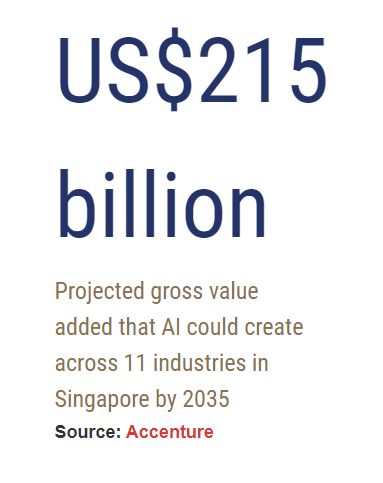Put IT into Practice
Powerful technologies from artificial intelligence to quantum computing promise to transform the world of finance and other industries. Whether these innovations deliver on their promises — while also mitigating the risks — depends on the business leaders and would-be leaders wielding them.
It is difficult, if not impossible, to imagine a world where the ‘triple A’ technologies of automation, analytics and artificial intelligence (AI) do not exist. The impact of these digital disruptions is felt by the multitudes who use mobile payment services to buy everyday items, as well as by financial institutions that have adopted blockchain and cryptocurrencies. It is felt by enterprises that use analytics tools to obtain actionable insights and improve their business processes. And it is felt by countries like Singapore as they seek to build intelligent transportation systems and other characteristics of a smart city.

With reference to Singapore’s Smart Nation vision, Singapore Management University (SMU)’s Assistant Professor of Information Systems and Director of the Master of IT in Business (AI) programme, Dai Bing Tian, said that some of the biggest changes resulting from AI implementation have come in the logistics and maritime industries. For example, computer algorithms are increasingly being used to make decisions about how to arrange ships and vehicles, or how to manage cargo and point-to-point deliveries.
“It is tedious to let a human consider all possible solutions to satisfy resource constraints. However, computers have larger capacities to systematically search for such solutions, which suppress the human brain in planning,” said Asst Prof Dai.
Another exciting new frontier is quantum computing, which considers a lot more information at once and allows all possible calculations to be performed simultaneously, instead of one at a time like in current computers. In other words, huge reams of data can be processed faster and more accurately. “This could massively, exponentially, speed up calculations for the large data sets found in big data,” explained SMU’s Associate Professor of Information Systems and Director of the Master of IT in Business (Financial Technology & Analytics) programme, Paul Griffin.

Because quantum information, or qubits, does not have a definite value, quantum computing could, in theory, shake up the financial services industry by better predicting stock prices and optimising investment portfolios. It could also benefit other industries creating and using AI systems, not to mention spur the development of new chemicals and advanced materials.
“If we think about what has been achieved already with our current computers and imagine what could be achieved with computers millions of times more powerful, the mind boggles,” said Assoc Prof Griffin. Indeed, leading statistics portal Statista forecasts a jump in global quantum computing revenues from US$90 million in 2019 to over US$2.5 billion by 2029.

GROOMING LOCAL TALENT
There is, of course, an element of risk — perhaps a damaging one at that — in bringing any budding or untested technology to the market, cybersecurity being one of the most hotly-debated issues. Amid the pursuit of AI applications, worries have been voiced about personal data protection and privacy, especially in user modelling systems which make recommendations based on knowledge of people’s preferences. Quantum computing could tighten current encryption methods just as easily as it could break them, which would affect anyone who sends sensitive data over the Internet and may even destabilise the world around us.
Ethical concerns also abound over the development of these technologies — or “what can and cannot be done”, as Asst Prof Dai put it. For example, the seemingly limitless potential of AI and quantum computing has brought up the possibility that we may one day be able to replicate the human brain, throwing into question the idea of whether humans can or even should co-exist peacefully with conscious machines. With regulation just beginning to catch up to new technologies, the responsibility for setting such boundaries often falls to the computer scientists themselves.
Compared to the more advanced Western countries and the economic behemoth that is China, Southeast Asia’s emerging technology ecosystem is still in its infancy, partly due to the hefty financial outlay required. Nevertheless, opportunities exist for some players in the region to explore these technologies. “Small start-ups can’t easily create their own quantum computers but can provide highly technical consultancy services on how best to use quantum computers now and in the future. Start-ups are spread around globally, with a good number in Singapore,” said Assoc Prof Griffin.
In anticipation of the skyrocketing regional demand for new digital technologies over the next decade, the work of building a pool of highly-skilled individuals to design and run the computers therefore starts now. Said Asst Prof Dai: “We should focus on nurturing our local talents in this region to prepare for the AI era. All AI scientists have to be trained with strong technical skills and business sense.”

Mr Soo Zhi Kai
MITB (Financial Services Analytics*) graduate, Class of 2019
Country Regulatory Advisory & Project, Maybank Singapore
*The “Financial Services Analytics” track has since been renamed “Financial Technology & Analytics”.
SMU offers a Master of IT in Business (MITB) programme, which consists of three tracks: Analytics, Financial Technology & Analytics, and Artificial Intelligence. In the recent QS Masters in Business Analytics Rankings 2020, the programme was ranked 1st in Asia for the second year running, and 14th worldwide. For more information, click here.
This article was reproduced from CNA Brand Studio: https://www.channelnewsasia.com/news/brandstudio/smumasters/informationsystems
Find out more about MITB or other SMU postgraduate programmes at the SMU Masters Day ONLINE on 3 October. Register here!







